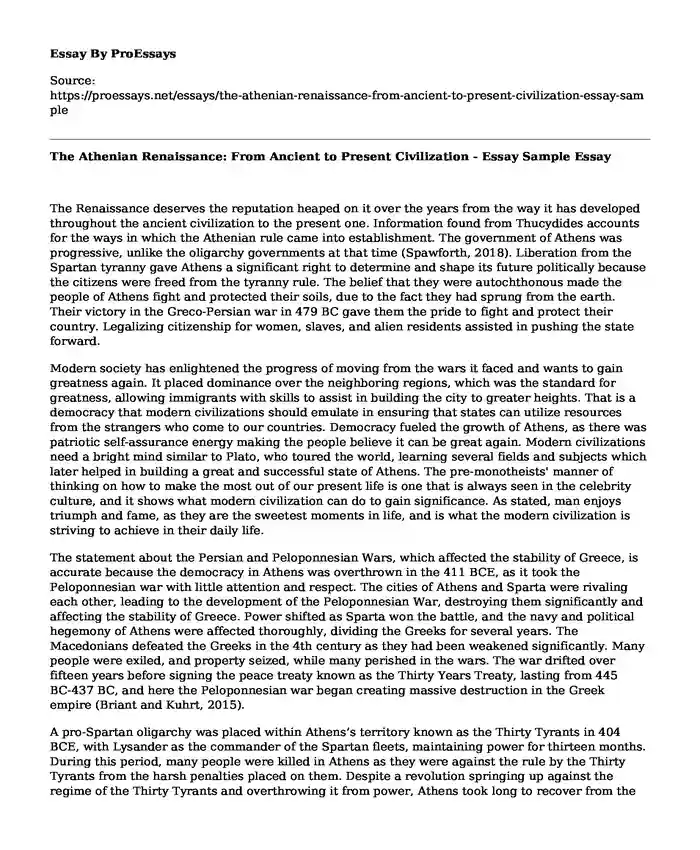The Renaissance deserves the reputation heaped on it over the years from the way it has developed throughout the ancient civilization to the present one. Information found from Thucydides accounts for the ways in which the Athenian rule came into establishment. The government of Athens was progressive, unlike the oligarchy governments at that time (Spawforth, 2018). Liberation from the Spartan tyranny gave Athens a significant right to determine and shape its future politically because the citizens were freed from the tyranny rule. The belief that they were autochthonous made the people of Athens fight and protected their soils, due to the fact they had sprung from the earth. Their victory in the Greco-Persian war in 479 BC gave them the pride to fight and protect their country. Legalizing citizenship for women, slaves, and alien residents assisted in pushing the state forward.
Modern society has enlightened the progress of moving from the wars it faced and wants to gain greatness again. It placed dominance over the neighboring regions, which was the standard for greatness, allowing immigrants with skills to assist in building the city to greater heights. That is a democracy that modern civilizations should emulate in ensuring that states can utilize resources from the strangers who come to our countries. Democracy fueled the growth of Athens, as there was patriotic self-assurance energy making the people believe it can be great again. Modern civilizations need a bright mind similar to Plato, who toured the world, learning several fields and subjects which later helped in building a great and successful state of Athens. The pre-monotheists' manner of thinking on how to make the most out of our present life is one that is always seen in the celebrity culture, and it shows what modern civilization can do to gain significance. As stated, man enjoys triumph and fame, as they are the sweetest moments in life, and is what the modern civilization is striving to achieve in their daily life.
The statement about the Persian and Peloponnesian Wars, which affected the stability of Greece, is accurate because the democracy in Athens was overthrown in the 411 BCE, as it took the Peloponnesian war with little attention and respect. The cities of Athens and Sparta were rivaling each other, leading to the development of the Peloponnesian War, destroying them significantly and affecting the stability of Greece. Power shifted as Sparta won the battle, and the navy and political hegemony of Athens were affected thoroughly, dividing the Greeks for several years. The Macedonians defeated the Greeks in the 4th century as they had been weakened significantly. Many people were exiled, and property seized, while many perished in the wars. The war drifted over fifteen years before signing the peace treaty known as the Thirty Years Treaty, lasting from 445 BC-437 BC, and here the Peloponnesian war began creating massive destruction in the Greek empire (Briant and Kuhrt, 2015).
A pro-Spartan oligarchy was placed within Athens’s territory known as the Thirty Tyrants in 404 BCE, with Lysander as the commander of the Spartan fleets, maintaining power for thirteen months. During this period, many people were killed in Athens as they were against the rule by the Thirty Tyrants from the harsh penalties placed on them. Despite a revolution springing up against the regime of the Thirty Tyrants and overthrowing it from power, Athens took long to recover from the damage already done by the brutal regime over the years that followed. The process of recalling the many people who had been exiled led to instabilities in the political class on the Spartans, and their influence decreased tremendously internationally. War has been a primary setback in many countries leading to great losses of lives, and property, and the progress that had been build crumbling to dust. That is the main reason the Persian and Peloponnesian Wars affected stability in Greece over an extended period (Papazarkadas, 2017).
References
Briant, P., & Kuhrt, A. (2015). Persian Wars: the Persian viewpoint. In Oxford Research Encyclopedia of Classics. Retrieved from https://oxfordre.com/classics/view/10.1093/acrefore/9780199381135.001.0001/acrefore-9780199381135-e-4890
Papazarkadas, N. (2017). Sacred and public land in ancient Athens. Oxford University Press. https:// 10.1093/acprof:oso/9780199694006.001.0001
Spawforth, T. (2018). The Story of Greece and Rome. Yale University Press. Retrieved from https://www.amazon.com/Story-Greece-Rome-Tony-Spawforth/dp/0300217110
Cite this page
The Athenian Renaissance: From Ancient to Present Civilization - Essay Sample. (2023, Nov 03). Retrieved from https://proessays.net/essays/the-athenian-renaissance-from-ancient-to-present-civilization-essay-sample
If you are the original author of this essay and no longer wish to have it published on the ProEssays website, please click below to request its removal:
- Abraham Lincoln's Opinion on Slavery During the Civil War
- Research Paper on Jews Under Nazi Occupation During World War II
- Essay Example on the Weakness of Technology in Warfare
- Essay Example on Artist Sam Gilliam's Mental Health Fight: A Case Study
- Research Paper on Cold War: A Historical Analysis of its Causes and Effects
- Essay Example on Texas Independence: From Mexico to the U.S. (1821-1835)
- Ethnocentrism & Eugenics: 400BC to Present - Essay Sample







